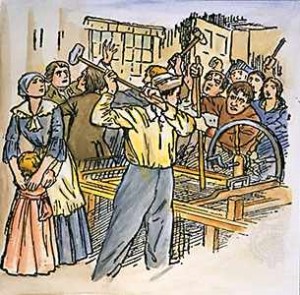International Workers’ Day
A Reminder of U.S. Progress on Workers’ Rights
by Laura L. Finley
May 1 is International Workers’ Day. It is a day to be reminded that “just and favorable†work conditions, “equal pay
for equal work,†workplaces “free of discrimination,†and “protection against unemployment†are fundamental human rights enshrined in the Universal Declaration of Human Rights. Unfortunately, May 1st is a day to recognize  the many ways the U.S fails to enact the human right to work. I offer here just a few of the many ways the U.S is falling short, recognizing the many other workers who toil in poor conditions for low pay that remain marginalized and often voiceless.
the many ways the U.S fails to enact the human right to work. I offer here just a few of the many ways the U.S is falling short, recognizing the many other workers who toil in poor conditions for low pay that remain marginalized and often voiceless.
Just and fair work conditions are far from reality for many of the people who produce our food. Agricultural workers and those who labor in slaughterhouses, meat-packing, and related industries are often subject to horrifying work environments, as depicted in films like Food, Inc. These workers suffer injury, health conditions, and low salaries. Many times, they are victims of wage theft, whereby employers will mandate overtime but not pay for it, slice time off timesheets, or promise day wages that never come. Miami Dade County was the first to enact a Wage Theft Ordinance to offer at least a modicum of redress for those who are victimized, yet most other cities have nothing to protect workers who fall prey to their greedy employers.
Americans’ insatiable demand to consume fuels a global marketplace that is increasingly anti-worker. Bigger, better, faster more is what we want, and companies like Walmart are all too happy to give it to us at the lowest price. But while the cost to the consumer remains low, the cost to the worker is as high as ever. Children’s fingers whirl as they make Disney products for American kids, knowing they will never make enough to own one. Women in Bangladesh and Jordan have just 3.3 minutes to sew those sexy panties we buy at Victoria’s Secret for $14. The worker makes 4 cents. Sweatshops are not just overseas, either. They can be found in many major cities. Yet we turn a blind eye, perhaps paying attention to atrocities like the recent fire in Bangladesh that killed more than 200 young women only as we drive back to the mall to buy more stuff we don’t need.
As has been well-documented, women still do not receive equal pay for equal work, fifty years after President John F. Kennedy signed the Equal Pay Act. The American Association of University Women’s (AAUW) 2012 report showed that full-time, working women still make 82 percent of what their male peers earn. The re-introduced Paycheck Fairness Act, which President Obama supported when he ran for office in 2008, would close loopholes in the Equal Pay Act by requiring that employers show that pay disparities are actually related to job performance and requirements, not gender, strengthening support for victims of wage discrimination, and prohibiting retaliation against workers who disclose their wages to colleagues.
In 29 states, it is perfectly legal for an employer to fire someone for being gay, and in 34 states, employers may lawfully fire transgendered persons. There is currently no federal law that prohibits workplace discrimination against lesbians, gays, bisexuals, and transgendered (LGBT) persons. The Employment Non-Discrimination Act (ENDA), modeled after Title VII of the 1964 Civil Rights Act, would create such a ban.
It would be impossible for Americans not to be aware of our nation’s shortcomings in regard to the human right to “protection against unemployment.†But what many do not know is that victims of domestic violence are ineligible for unemployment benefits. Studies show that victims miss an average of nearly eight million paid work days a year because abusers sabotage their transportation, prohibit them from leaving, or injure them so badly they cannot work. Victims often remain with abusers in life-threatening situations because they do not have adequate finances to get out.
This May 1st, let us all take a moment to consider the people whose work is undervalued, who suffer so that the rest of us can enjoy, and who are at-risk only because of their gender or sexual orientation.
Laura L. Finley, Ph.D., is Assistant Professor of Sociology & Criminology, Barry University and writes for PeaceVoice.

“…and who are at-risk only because of their gender…”
It is important to remember more than one day a year that workers still have a long way to go to reach anything approaching equity and justice. But it would be helpful if such analyses were gender balanced, rather than continuing to paint women as the primary victims of workplace inequality.
In 2011, men in the US suffered 92.2% of all workplace fatalities – a total of 4,342 men died that year trying to put bread on the table (compared to 375 women).
As gender specialist Dr. Warren Farrel pointed out in his seminal The Myth of Male Power in 1993, men are the “disposable sex” in America – both in war and in peace – and this is considered so much business as usual that it goes without mention.
1